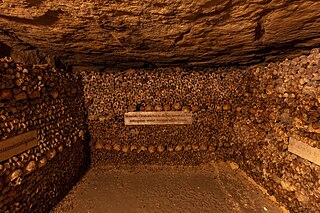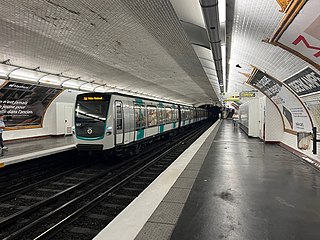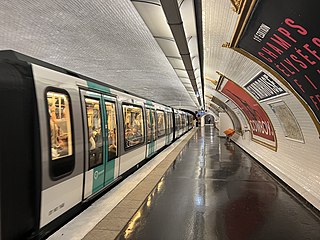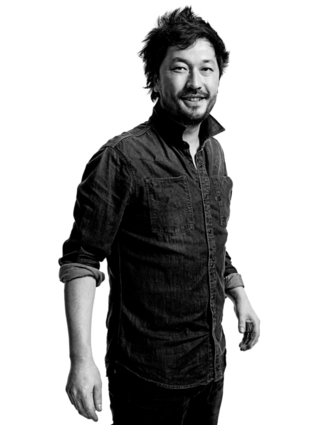
The Catacombs of Paris are underground ossuaries in Paris, France, which hold the remains of more than six million people. Built to consolidate Paris's ancient stone quarries, they extend south from the Barrière d'Enfer former city gate; the ossuary was created as part of the effort to eliminate the effects of the city's overflowing cemeteries. Preparation work began shortly after a 1774 series of basement wall collapses around the Holy Innocents' Cemetery added a sense of urgency to the cemetery-eliminating measure, and from 1786, nightly processions of covered wagons transferred remains from most of Paris's cemeteries to a mine shaft opened near the Rue de la Tombe-Issoire.

The 2nd arrondissement of Paris is one of the 20 arrondissements of the capital city of France. In spoken French, this arrondissement is colloquially referred to as deuxième. It is governed locally together with the 1st, 3rd and 4th arrondissement, with which it forms the 1st sector of Paris.

The 11th arrondissement of Paris is one of the 20 arrondissements of the capital city of France. In spoken French, the arrondissement is referred to as le onzième.

Ménilmontant is a station on Line 2 of the Paris Métro, on the border of the 11th and 20th arrondissements.

République is a station on lines 3, 5, 8, 9 and 11 of the Paris Métro. It is located under the Place de la République, at the tripoint border of the 3rd, 10th and 11th arrondissements. It is an important interchange station; its 16.6 million users (2019) make it the seventh busiest out of 302 on the Métro network.

Parmentier is a station on Paris Métro Line 3 located in the 11th arrondissement of Paris.

Oberkampf is a station of the Paris Métro, serving Lines 5 and 9 and located in the 11th arrondissement of Paris.

Montreuil, also known unofficially as Montreuil-sous-Bois, is a commune in the eastern suburbs of Paris, France. It is located 6.6 km (4.1 mi) from the centre of Paris, in the Seine-Saint-Denis department and in the Métropole du Grand Paris. With a population of 111,367 as of 2020, Montreuil is the third most populous suburb of Paris after Boulogne-Billancourt and Saint-Denis. It is located north of Paris's Bois de Vincennes, on the border with Val-de-Marne.

Saint-Ambroise is a station on Line 9 of the Paris Métro, located in the 11th arrondissement of Paris. It is under Boulevard Voltaire.

Christophe-Philippe Oberkampf was a French naturalized German industrialist. He became famous for founding the royal manufacture of printed cottons of Jouy-en-Josas where the toile de Jouy was manufactured.

The Centre-Sud is a neighbourhood located in the easternmost edge of the Ville-Marie borough of the city of Montreal.

The Rue Bonaparte is a street in the 6th arrondissement of Paris. It spans the Quai Voltaire/Quai Malaquais to the Jardin du Luxembourg, crossing the Place Saint-Germain-des-Prés and the Place Saint-Sulpice and has housed many of France's most famous names and institutions as well as other well-known figures from abroad.

Le MUR, an acronym for "modulable, urban, and reactive," is a French association founded in 2003 with the goal of promoting contemporary and, in particular, urban art. It is a non-profit organization under French law (1901) and was founded by the French painter and sculptor Jean Faucheur, the situationist Thomas Louis Jacques Schmitt, known as "Thom Thom," Malitte Matta, and the art collector Bob Jeudy.

The Rue Radziwill is a street in the 1st arrondissement of Paris. It starts at 1 rue des Petits-Champs and ends in a dead end. It was named after Polish nobleman and politician Karol Stanisław Radziwiłł.

The Boulevard Voltaire is a well-known boulevard in the 11th arrondissement of Paris. It was created by Baron Georges-Eugène Haussmann during the reign of French emperor Napoleon III. Originally named the Boulevard du Prince-Eugène, it was renamed the Boulevard Voltaire on 25 October 1870 in honour of the French Enlightenment writer, historian, and philosopher Voltaire.

Nicolas-Auguste Leisnier (1787-1858) was a French engraver specialising in burin.

The Place des Émeutes-de-Stonewall is a public square in Paris, France.
Connaissance des arts is a monthly French art magazine devoted to the arts and their current events, published since March 1952 by the French Society for the Promotion of Art. Its headquarters are on the rue du Quatre-Septembre in Paris.

Pierre Sang Boyer is a South-Korean born French chef. In 2011, he was a finalist at the French version of Top Chef.


















